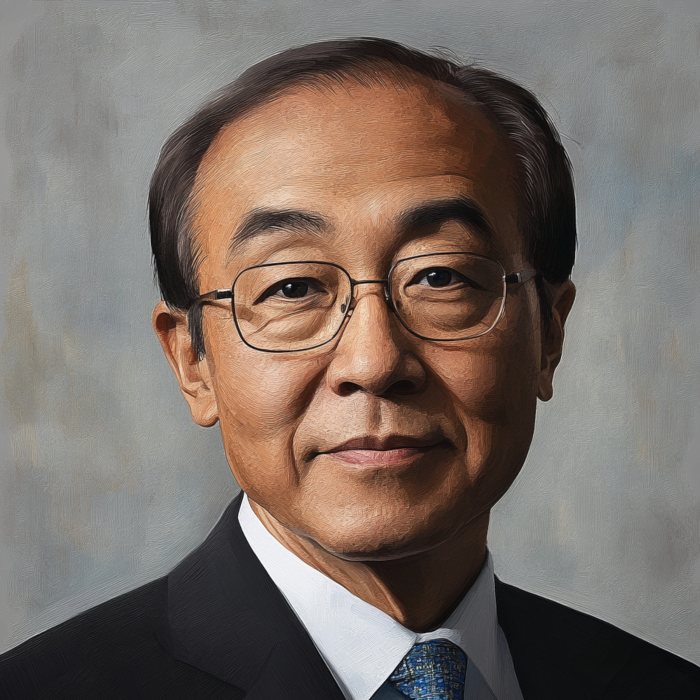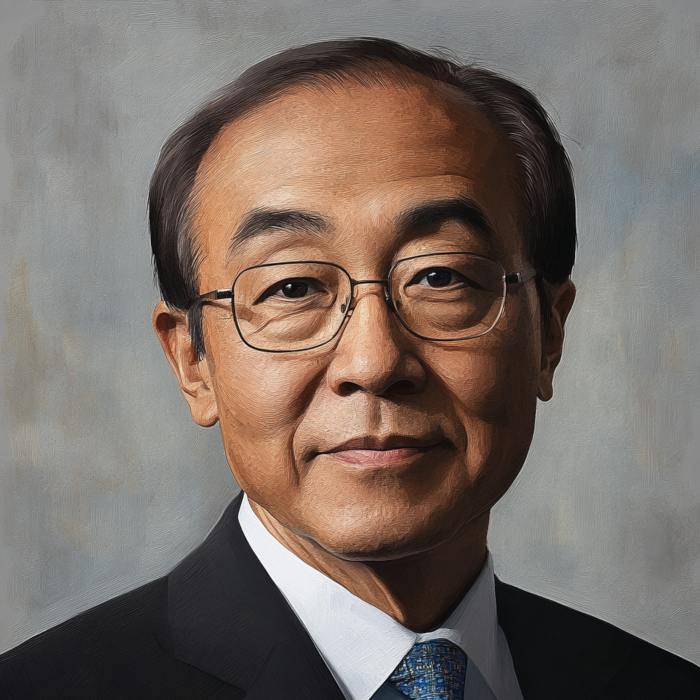


Ban Ki-moon (born June 13, 1944) is a South Korean diplomat and politician who served as the eighth Secretary-General of the United Nations (UN) from January 2007 to December 2016. During his tenure, Ban focused on addressing climate change, promoting sustainable development, advocating for human rights, and reforming the United Nations to enhance its effectiveness in responding to global challenges. He is known for his diplomatic skills, commitment to global peace, and efforts to strengthen international cooperation.
Birth: Ban Ki-moon was born on June 13, 1944, in Eumseong County, which is now part of North Chungcheong Province, South Korea. His early life was marked by the hardships of the Korean War, which profoundly influenced his views on peace and international relations.
Education: Ban was an exceptional student, showing early promise in his studies. He earned a bachelor's degree in International Relations from Seoul National University in 1970. Later, he pursued further studies in the United States, earning a Master of Public Administration from the John F. Kennedy School of Government at Harvard University in 1985.
Ban Ki-moon joined South Korea's Ministry of Foreign Affairs in 1970 and steadily rose through the ranks. His diplomatic career spanned several decades and included a variety of key roles:
Early Diplomatic Roles: Ban served in South Korea's embassies in New Delhi, Washington, D.C., and Vienna, gaining significant experience in international diplomacy. He also held positions in the South Korean government, including as Director of the United Nations Division.
Foreign Minister of South Korea: In 2004, Ban was appointed as South Korea's Minister of Foreign Affairs and Trade, where he played a crucial role in South Korea's diplomatic efforts, particularly in navigating relations with North Korea and managing the country's involvement in international organizations.
Ban Ki-moon was elected as the eighth Secretary-General of the United Nations in 2006, succeeding Kofi Annan. He officially took office on January 1, 2007, and was re-elected for a second five-year term in 2011.
During his ten years as Secretary-General, Ban Ki-moon focused on several major global issues:
Climate Change: One of Ban's most significant contributions was his leadership in addressing climate change. He prioritized the issue early in his tenure, helping to raise global awareness and galvanize international action. His efforts culminated in the landmark Paris Agreement on climate change in 2015, where 196 countries agreed to work together to limit global warming.
Sustainable Development: Ban played a crucial role in the adoption of the 2030 Agenda for Sustainable Development, which includes the 17 Sustainable Development Goals (SDGs). These goals provide a comprehensive framework for eradicating poverty, protecting the planet, and ensuring prosperity for all by 2030.
Human Rights and Gender Equality: Ban was a strong advocate for human rights, emphasizing the need to protect vulnerable populations, including women, children, and refugees. He launched the UN's first-ever campaign to end violence against women and pushed for greater gender equality across all areas of the UN's work.
Peacekeeping and Conflict Resolution: Ban worked to strengthen the UN's peacekeeping operations, which are essential in maintaining international peace and security. He also supported diplomatic efforts to resolve conflicts in places like Syria, Sudan, and the Democratic Republic of the Congo, though with varying degrees of success given the complexity of these crises.
UN Reform: Recognizing the need for the United Nations to adapt to new global challenges, Ban pursued reforms to improve the organization's efficiency, accountability, and responsiveness. He advocated for greater transparency and worked to enhance the UN's ability to respond to humanitarian crises and conflicts.
While Ban Ki-moon achieved significant successes, his tenure also faced criticism and challenges:
Syrian Civil War: Ban's efforts to mediate the Syrian conflict and bring about a peaceful resolution were largely unsuccessful, as the war continued to devastate the country and create a massive humanitarian crisis. The UN's inability to prevent or effectively address the situation led to criticism of the organization's limitations.
UN Bureaucracy: Some critics argued that Ban's efforts to reform the UN bureaucracy were insufficient to overcome the deeply entrenched inefficiencies and complexities within the organization. Despite his attempts at reform, many of the issues he sought to address remained unresolved.
Personal Style: Ban Ki-moon was often described as a quiet and reserved leader, which some critics interpreted as a lack of assertiveness, particularly in the face of powerful member states. However, supporters viewed his diplomatic approach as a reflection of his commitment to consensus-building and respect for the diverse perspectives of UN member states.
After stepping down as Secretary-General at the end of 2016, Ban Ki-moon continued to be active in global affairs:
Elder Statesman: Ban joined The Elders, an independent group of global leaders founded by Nelson Mandela, which works to promote peace, justice, and human rights worldwide.
Climate Advocacy: Ban remained deeply involved in climate change advocacy, co-chairing the Global Commission on Adaptation, which focuses on adapting to the impacts of climate change.
Ban Ki-moon Centre for Global Citizens: He also co-founded the Ban Ki-moon Centre for Global Citizens, an organization that promotes global citizenship, sustainable development, and leadership among young people.
Ban Ki-moon's legacy is characterized by his unwavering commitment to global cooperation, his efforts to address the most pressing issues of our time, and his advocacy for a more inclusive and sustainable world. He is widely respected for his integrity, diplomatic skills, and dedication to the principles of the United Nations.
Despite the challenges and criticisms he faced, Ban's tenure as Secretary-General saw significant progress in areas such as climate change, sustainable development, and human rights, leaving a lasting impact on the global stage. His leadership continues to inspire efforts toward building a more peaceful, equitable, and sustainable world.

We use cookies
We use cookies and other tracking technologies to improve your browsing experience on our website, to show you personalized content and targeted ads, to analyze our website traffic, and to understand where our visitors are coming from. Privacy Policy.